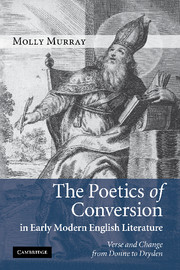Book contents
- Frontmatter
- Contents
- Acknowledgments
- Note on the text
- Introduction: toward a poetics of conversion
- 1 William Alabaster's lyric turn
- 2 John Donne and the language of de-nomination
- 3 Richard Crashaw and the gender of conversion
- 4 Versing and reversing in the poetry of John Dryden
- Afterword: Eliot's inheritance and the criticism of conversion
- Bibliography
- Index
4 - Versing and reversing in the poetry of John Dryden
Published online by Cambridge University Press: 04 August 2010
- Frontmatter
- Contents
- Acknowledgments
- Note on the text
- Introduction: toward a poetics of conversion
- 1 William Alabaster's lyric turn
- 2 John Donne and the language of de-nomination
- 3 Richard Crashaw and the gender of conversion
- 4 Versing and reversing in the poetry of John Dryden
- Afterword: Eliot's inheritance and the criticism of conversion
- Bibliography
- Index
Summary
The Aesopian pastoral of The Hind and the Panther might seem an unlikely endpoint for a book on the early modern poetics of conversion, for a number of reasons. First, Dryden's poem is late: composed and published soon after his conversion to Catholicism in 1685, it appeared in print almost four decades after the death and posthumous publication of Richard Crashaw's Carmen Deo Nostro. It is also long: a three-part beast fable, amounting to some 1,300 lines of heroic couplets. But most importantly, the poem seems to offer a clear and unequivocal statement of its author's religious position, precisely the kind of statement rejected, in various ways, by Alabaster, Donne, and Crashaw. We have seen how Alabaster's sonnets express the volatility of belief, how Donne's early satires and late lyrics insist upon the inexpressibility of belief, how Crashaw's hymns and verse epistles demonstrate the hybridizing of belief. In contrast, Dryden's theological fable – idealizing Catholicism in the serene figure of the Hind, and lampooning the Protestant churches as a motley menagerie – seems definitive and single-minded, celebrating the sufficient end of its author's devotional uncertainty. “My doubts,” the poet triumphantly announces toward the beginning of his fable, “are done” (i.78).
Acknowledging Dryden's devotional convictions, however, should not lead us to dismiss their poetic expression as either simple or straightforward.
- Type
- Chapter
- Information
- The Poetics of Conversion in Early Modern English LiteratureVerse and Change from Donne to Dryden, pp. 138 - 172Publisher: Cambridge University PressPrint publication year: 2009

